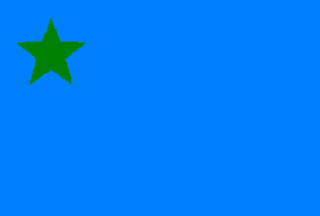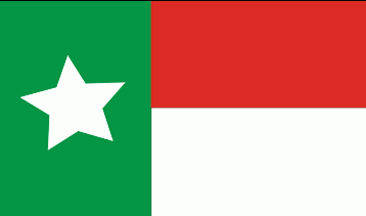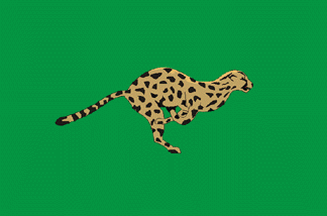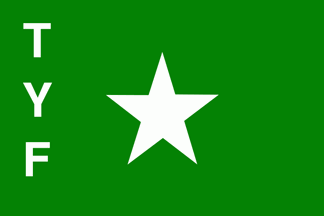 image
by Chrystian Kretowicz, 19 April 2009
image
by Chrystian Kretowicz, 19 April 2009
FOTW beschäftigt sich mit der Wissenschaft der Vexillologie (Flaggenkunde).
Alle auf dieser Website dargebotenen Abbildungen dienen ausschließlich der Informationsvermittlung im Sinne der Flaggenkunde.
Wir distanziert uns ausdrücklich von allen hierauf dargestellten Symbolen verfassungsfeindlicher Organisationen.
Last modified: 2011-03-19 by ian macdonald
Keywords: india | tripura | twipra | borok nation |
Links: FOTW homepage |
search |
disclaimer and copyright |
write us |
mirrors
 image
by Chrystian Kretowicz, 19 April 2009
image
by Chrystian Kretowicz, 19 April 2009
Tripura is a state in North-East India, with
an area of 4,036 sq. mi. or 10,453 km². Population: @ 3 200 000. Tripura is
surrounded by Bangladesh on the north, south, and west. The Indian states
of Assam and Mizoram lie to the east. The capital is Agartala and the main
languages spoken are Bengali and Kokborok (also known as Tripuri). It was
formerly an independent Tripuri kingdom and was merged with independent India
on 15 October 1949 by the Tripura Merger Agreement. It was also known as Hill
Tippera (anglicized version of Tipra) during the British Raj period and has a
history of over 2500 years and 186 kings.
More at:
http://en.wikipedia.org/wiki/Tripura and
http://www.twipra.com/Services/Articles/ShowDocument?articleID=f063eacf35c154f6
"Prior to the merger with Indian union in Oct. 15, 1949,
Twipra, a
princely independent state was a peaceful and self-sufficient endowed with
all resources of revenue and income. After the partition (1947) of the Indian
subcontinent (India and Pakistan) and the subsequent merger of Twipra with
India, there had been unprecedented influx of foreign nationals in to the
state of present Twipra, particularly the Bengali Hindus from erstwhile East
Pakistan, now Bangladesh and mainland India. Before the merger the Borok
people who were in absolute majority in their own homeland (Twipra) and
accounted for more than 99% of the total population of the present state of
Twipra, have now been reduced to a mere 31% (as per 2001 Census) in the
state. In fact, Twipra is the only state in India and one of the few places
in the world in the 20th century whose indigenous people have been transformed from
being a numerical majority and ruling community in to a minority with almost
no economic and political back bone within 56 years of the merger (i.e.
1949-2005). Such a dramatic change in the demographic profile of the state
has had wide ranging economic, political, cultural, religious and social
implications for its people. But till now there has been no protective
measures taken by either the Twipra state Government or the central to
prevent the unabated process of infiltration in to the state. Thus, the
demographic profile of the state has threatened the very existence of the
Borok people in their native land. If this trend continues in Twipra for
another 50 years the Borok people will certainly be wiped out from the
demographic scene of Twipra state."
James B. Minahan (Encyclopedia of the Stateless Nations -
Ethnic and National Groups Around the World - volume IV) presents a
flag of the Tripuris: "The Tripuri national flag, the flag of the
national movement, is a pale blue field bearing a single green five-pointed
star on the upper hoist." Mr.Minahan doesn't specify what "national
movement" it can be.
Chrystian Kretowicz, 19 April 2009
 image
by Chrystian Kretowicz, 19 April 2009
image
by Chrystian Kretowicz, 19 April 2009
Ethnic conflict in Tripura is
described in considerable detail at:
http://k.1asphost.com/borok/Ethnic_Clash_in_Tripura.asp
Among many
liberation organization in Tripura / Twipra the most important are NLFT -
National Liberation Front of Tripura, ATTF - All Tripura Tiger Force and BNCT
- Borok National Council of Tripura.
"The National Liberation Front of
Tripura (NLFT) was formed on March 12, 1989, with Dhananjoy Reang (former
Vice-President of the Tripura National Volunteers) as its "chairman". Reang
after being "expelled" from the NLFT in 1993 formed a separate outfit, the
Tripura Resurrection Army (TRA), but surrendered in the year 1997. After
Reang’s removal, Nayanbasi Jamatiya became leader of the outfit and later
Biswamohan Debbarma took over. However, another split occurred in September
2000 following differences between the Halam and Debbarma tribal members of
the NLFT. Thus, the Borok National Council of Tripura (BNCT) was formed by
Jogendra alias Joshua Debbarma. Personal ambitions of the leaders and
parochial religious considerations are believed to have caused yet
another split in 2001 when Nayanbasi Jamatiya and Biswamohan Debbarma parted
ways from the parent outfit to have factions of the NLFT under their
respective leaderships. Further, the fourth split is said to have occurred in
June 2003 when Biswamohan Debbarma was deposed allegedly at the behest of
NLFT's patrons inside Bangladesh and Mantu Koloi was placed as the leader of
that faction. Debbarma is reported to have subsequently set up separate camps
on the Tripura-Bangladesh border with his followers.
The NLFT was
outlawed in April 1997 under the Unlawful Activities (Prevention) Act, 1967,
following its involvement in terrorist and subversive activities. It is also
proscribed under the Prevention of Terrorism Act (POTA), 2002.
The
purported objective of the NLFT is to establish an "independent" Tripura
through an armed struggle following the liberation from "Indian
neo-colonialism and imperialism" and furtherance of a "distinct and
independent identity"."
http://satp.org/satporgtp/countries/india/states/tripura/terrorist_outfits/nlft.htm
FLAG: The Flag of NLFT (or TNLF - Twipra National Liberation Front -
that's how they prefer to be called) shall be Tri-colour in the ratio of 3:2
size(length to breadth) comprising of green, white and red colour and a star
shall be affixed on the middle of green portion.
(1) Green colour - It
signifies 'Sovereignty' of the land (country) where we live.
(2) White
colour - It signifies 'Peace' of the land who are peace loving and they shall
continue to fight/struggle for their peaceful means.
(3) Red colour - It
signifies 'Revolution'. The peace loving people will get down to revolution
to achieve their goals/right at the cost of even bloodshed if it so
warranted.
(4) Star - A star on the green portion of the Flag signifies to
be the guiding anchor for the whole Borok nation.
My rendition of this
flag has a "fat" star slightly tilted, while Jaume has a straight star on
Catalan wikipedia:
http://ca.wikipedia.org/wiki/Front_d'Alliberament_Nacional_de_Tripura. Those
must be variants, as the shape of the star is not elaborated in the
constitution of TNLF.
Chrystian Kretowicz, 19 April 2009
 image
by Jaume Ollé, 19 April 2009
image
by Jaume Ollé, 19 April 2009
The All Tripura Tiger Force (ATTF) was
originally founded as All Tripura Tribal Force on July 11, 1990, by a group
of former Tripura National Volunteers (TNV) terrorists, who under the
leadership of Ranjit Debbarma dissociated themselves from a faction of the
TNV led by Lalit Debbarma which surrendered arms in accordance with the
August 1988 Accord concluded between the TNV and the Union government. According to the ATTF, the outfit rechristened itself as All Tripura
Tiger Force by substituting the word 'Tribal' with 'Tiger' sometime in 1992.
It was initially a small group of tribal extremists who operated in
pockets of North and South Tripura districts. Gradually, it began mobilising
manpower by recruiting tribal youth and enhancing the firepower of its
cadres. And by year 1991, it emerged as a formidable terrorist group in
Tripura. However, more than 1,600 cadres surrendered by March 1994,
under an amnesty scheme offered by the State Government. A group of ATTF
cadres which did not surrender revived the ATTF. It was subsequently banned
in April 1997 under the Unlawful Activities (Prevention) Act, 1967. Over the
years, the ATTF either formed or was associated with fringe
terrorist/criminal groupings such as the Tripura Tribal Youth Force (TTYF),
the Tripura Liberation Organization (TLO), the Tripura Young Rifle (TYR), the
Tripura Lion Force (TLF) and the Tripura National Army (TNA). Most of these
groups, however, have ceased to exist.
According to the available
literature, the outfit's objectives are:
1. Expulsion of all
Bengali-speaking immigrant settlers who entered Tripura after 1956.
2.
Restoration of land to tribals under 'Tripura Land Revenue and Land Reforms
Act', 1960.
3. Removal of names of migrants who entered Tripura after 1956
from the electoral roll.
More at:
http://satp.org/satporgtp/countries/india/states/tripura/terrorist_outfits/attf.htm
All Tripura Tiger Force has a beautiful flag - a
tiger in full sprint on the green field.
Chrystian Kretowicz, 19
April 2009
I wonder if a faulty zoology is at play here, because the animal is spotted,
not striped, and looks rather like a cheetah at first sight?
Knut, 24
February 2011
Also, it might be questioned if the tiger should be depicted in natural
colors; the Constitution of the All Tripura Tiger Force, Article No. 14 - Flag
and Symbol says:
(i) A. The flag will be coloured as green base with red
colour organisation symbol. The measurement of the flag will be 3 :2.
(ii) B.
In case if need the symbol of the flag with its colour will be changed.
http://www.satp.org/satporgtp/countries/india/states/tripura/documents/papers/attf_const.htm
Unfortunately, there is no further description of what that symbol is.
Obviously, from the name of the organization it would be logical to think it may
include a tiger, but that is not explicitly stated. And whatever it is, the main
version should have it in red, although variants are possible.
Ned Smith,
26 February 2011
 image
by Chrystian Kretowicz, 19 April 2009
image
by Chrystian Kretowicz, 19 April 2009
There is also the flag
of the "Tribal Youth Federation (in Bengali Upajati Juba Federation) which is
an organization affiliated to Democratic Youth Federation of India in
Tripura. TYF organizes youth from the tribal populations of the state. TYF
has a separate central committee and publishes Bini Kharad (Our Voice). The
supreme body of TYF is the Central Conference. TYF was founded in 1967 to
counter the influence of Tripura Upajati Juba Samiti. TYF works in close
coordination with Ganamukti Parishad and is often considered as the youth
wing of GMP."
http://en.wikipedia.org/wiki/Tribal_Youth_Federation
Chrystian Kretowicz, 19 April 2009
The
flag of Borok National Council of Twipra (Tripura) is still elusive.
Chrystian Kretowicz,
19 April 2009
Hosted by: Fanshop-Online.de und Handy-Shop.de
Tipp: Apple iPhone XS Plus